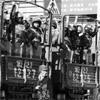China’s leaders vow to punish Xinjiang rioters
Hurriyet Daily News with wires

refid:12040712 ilişkili resim dosyası
China's leaders vowed Thursday to severely punish those responsible for bloodshed in the nation's far northwest that left at least 156 people dead and has exposed deep ethnic tensions.The warning came as riot police and soldiers maintained a firm grip on Urumqi, the capital of Xinjiang region where Muslim Uighurs and Han Chinese faced off this week in China's worst ethnic conflict for decades.
An urgent nine-member Politburo Standing Committee meeting, led by President Hu Jintao, called on Communist Party members and officials at all levels to mobilize to restore order and promised punishment to rioters and leniency to participants who were misled by agitators. "Preserving and maintaining the overall stability of Xinjiang is currently the most urgent task," Politburo said, reported the Associated Press, citing the official Xinhua News Agency. Local party leaders in Urumqi had on Wednesday warned that people involved in any killings would be sentenced to death, and earlier announced that more than 1,400 people had been arrested for their involvement in the unrest.
But in the Politburo statement, released following a meeting on Wednesday night, was the first comment from China's top leaders on the mayhem since it erupted Sunday. It emphasized that its top priority was to ensure no further unrest. "We must stress that stability overrides everything among cadres and the people of all ethnic groups in Xinjiang," it said. Hu was forced to abandon a visit to Italy for the Group of Eight summit and return to China to deal with the situation, in what observers said was an unprecedented move that illustrated the severity of the crisis. The Politburo member in charge of law enforcement traveled to Urumqi and spoke to tactical police officers Thursday.
Tentative signs of calm
The first comments from the nation's political leadership about the bloodshed came as tentative signs of normality returned to Urumqi, a city of 2.3 million people. Red stickers put up outside apartment compounds said, "Don't listen to any rumors" and "Keep calm and maintain public order."
Even though more shops had also re-opened after a three-day government-mandated business closure, many were still shuttered and residents remained extremely doubtful that normal life would resume any time soon. "How can it return to normal with so many soldiers," a Han woman surnamed Li in the city center, told Agence France-Presse. Crowds of Han Chinese, China's dominant ethnic group, cheered as trucks full of police that were covered in banners reading, "We must defeat the terrorists" and "Oppose ethnic separatism and hatred," rumbled by.
And the big bazaar in the main Uighur district remained shut, with Uighurs saying the closure was another example of the different rules they have to live by compared with the Han Chinese. "They said we could re-open after three days. But today is the fourth day and they are not letting us open," said a clothing shop owner.
Other areas of Xinjiang Ğ a sprawling, oil-rich territory that borders several Central Asian countries Ğ were also tense Thursday, residents said. In Kashgar, in the southern part of the region, the manager of an Internet cafe said the city did not feel safe.
"The city has a heavy military presence and it feels like a ghost town. No one is really walking around on the streets, whereas it's usually packed with people and traffic," said the manager, who would give only his surname Zhu.
He said many businesses are closed, especially ones operated by Han Chinese who think they may become targets if they stay open. The next major test for the government will come today, when large numbers of Muslim Uighurs gather for their weekly prayers. Obul Hashim Haxim, the imam at the Liu Dawn Mosque, said prayers would be held and that the violence would be discussed. Haxim, who is also a member of China's parliament, said the riots were bad for national unity. "We will tell the Muslim community to do their part to protect ethnic unity and social stability for a harmonious society," he said.
Chinese officials have said 156 people were killed and more than 1,100 people injured in the unrest in Urumqi.
















